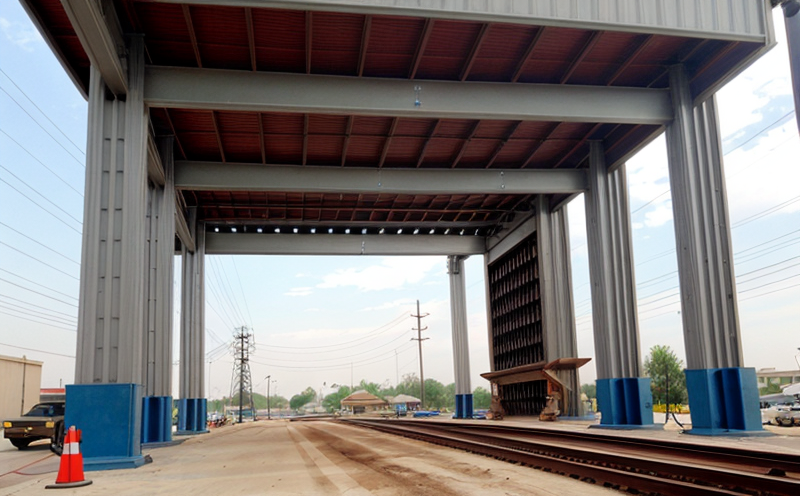ASTM D7249 Flexural Testing of Sandwich Composites
The ASTM D7249 flexural testing method is a critical procedure used in the aerospace and aviation industries to evaluate the mechanical properties of sandwich composites. This test assesses the bending strength, stiffness, and modulus of these materials under controlled conditions. The primary focus is on determining how well the composite withstands stress without yielding or breaking.
Sandwich composites are widely utilized in aerospace and aviation due to their excellent combination of lightweight and high-strength properties. These characteristics make them ideal for reducing fuel consumption, enhancing structural integrity, and improving overall performance of aircraft components such as wings, fuselages, and landing gear. The ASTM D7249 test ensures that these materials meet the stringent requirements set by regulatory bodies like NASA and FAA.
The testing process involves preparing a standard specimen according to specified dimensions outlined in ASTM D7249. Specimens are typically cut from larger panels of composite material, ensuring consistency across multiple tests. The specimens are then subjected to progressively increasing loads until they either reach their maximum load capacity or fail. This allows for the determination of crucial parameters like flexural strength and modulus.
Instrumentation used during this test includes high-precision universal testing machines capable of applying precise loads while measuring displacement with accuracy. Strain gauges may also be utilized to monitor internal stresses within the specimen throughout the testing process. Data collected from these instruments is analyzed to generate comprehensive reports detailing each parameter measured.
ASTM D7249 specifies strict acceptance criteria designed to ensure that only materials meeting industry standards are approved for use in aircraft manufacturing processes. Compliance with these criteria helps maintain safety and reliability across all aerospace applications where sandwich composites are employed.
This testing method plays a vital role not just within the manufacturing stage but also throughout an aircraft’s lifecycle, ensuring continued performance even after extensive usage over time. By adhering to rigorous testing protocols like those specified in ASTM D7249, manufacturers can confidently produce high-quality products that meet both current and future demands.
The importance of accurate flexural tests cannot be overstated given the critical nature of structural integrity in aviation applications. Any flaws or weaknesses identified through proper testing allow for necessary adjustments before widespread implementation, thereby preventing potential accidents or failures during flight operations.
Why It Matters
The results from ASTM D7249 flexural tests are essential for ensuring the safety and reliability of aerospace structures. Accurate determination of a composite’s bending characteristics helps prevent catastrophic failures that could lead to accidents or structural damage during service.
- Enhanced Safety: By accurately assessing how materials behave under load, engineers can design safer aircraft components knowing exactly what stresses they will encounter in real-world scenarios.
- Increased Durability: Testing ensures that materials used meet durability requirements, which is crucial for maintaining performance throughout an asset's lifespan.
- Regulatory Compliance: Meeting specified test standards demonstrates compliance with aviation regulations and standards set by organizations such as NASA, FAA, EASA, etc.
The comprehensive nature of this testing process ensures that every aspect influencing the structural integrity of aircraft components is thoroughly examined. This includes not only the composite itself but also how it integrates into larger assemblies and contributes to overall airframe performance.
Benefits
- Improved Material Selection: Provides detailed information on various types of sandwich composites, enabling manufacturers to select optimal materials for specific applications.
- Informed Design Decisions: Helps engineers make informed choices regarding component design based on material properties obtained from testing.
- Cost Efficiency: Ensures that only suitable materials are used, reducing waste and associated costs while improving overall efficiency.
- Enhanced Reliability: By identifying potential weak points early in the development process, manufacturers can address issues before they become critical problems.
The ASTM D7249 flexural test offers significant advantages by providing reliable data that supports informed decision-making. It enables manufacturers to create safer, more efficient aircraft structures while meeting all necessary regulatory requirements.
Environmental and Sustainability Contributions
- Reduced Weight: Lightweight sandwich composites contribute to lower fuel consumption and reduced emissions, promoting greener operations.
- Durable Materials: Longer-lasting components mean less frequent replacements, reducing maintenance costs and waste generation.
- Eco-Friendly Manufacturing Processes: Advanced testing ensures that materials are used efficiently, minimizing resource depletion during production.
The use of ASTM D7249 flexural tests contributes positively to environmental sustainability by encouraging the development of eco-friendly aircraft components. These efforts help reduce carbon footprints and promote sustainable practices in aerospace manufacturing.





